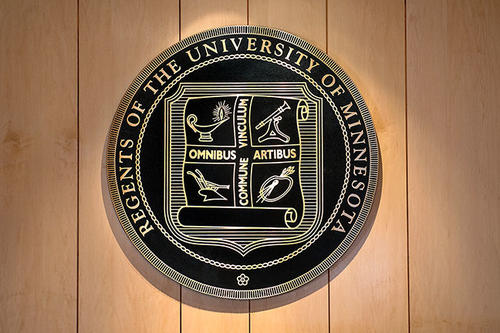
MINNEAPOLIS/ST. PAUL (3/31/2016) —At its meeting today, the University of Minnesota’s Board of Regents approved a resolution affirming the underlying values and principles of undergraduate enrollment for all five U of M campuses.
The Board’s action allows implementation of an enrollment and tuition plan for the Twin Cities campus, which will be in place through 2021.
The Twin Cities plan, reviewed in detail last month, will modestly grow the size of the undergraduate student body while increasing critical student services such as on-campus housing, academic advising and career preparation.
“As another year of record applications tells us, we continue to be in high demand for students in Minnesota and across the country,” said University President Eric Kaler. “By serving more students, particularly in engineering, biological sciences and business, we’ll be able to better meet the state’s workforce needs.”
One piece of the Twin Cities plan outlines tuition rates. The plan calls for minimizing resident tuition and raising out of state tuition to the midpoint of the Big Ten. The Board will consider several options for achieving there goals as they finalize the FY17 operating budget. These include:
- moving to the Big Ten midpoint in four years;
- raises of 7.5 – 10 percent annually over a longer period of time (than the five years of the plan);
- using “tuition discounting” in recruitment of new freshmen; and
- using “tuition discounting” to lower the effects of any tuition rate increases for continuing students.
The Board and President articulated an expectation and desire to hold tuition increases down for already-enrolled out-of-state students. Any change will be closely monitored to ensure geographical diversity of national and international students.
Discussions at Board work sessions in October and December 2015 influenced the plan’s development, which is one of the Board’s 2015-16 priorities.
FY17 budget planning
To inform continued planning regarding the fiscal year 2017 operating budget, the Board discussed the framework and revenue and cost assumptions driving development of the budget.
Among those items are: tuition and fees; compensation plans; internal reallocations; strategic investments, including new academic initiatives in support of the strategic plan; facilities and capital expenses; and ongoing operations.
President Kaler will recommend an FY17 operating budget to the Board in May, with formal action from the Board expected in June.
The Board also:
recognized rising faculty. Eight junior faculty members were formally installed as McKnight Land-Grant Professors. They are:
- Xiang Cheng, Chemical Engineering and Materials Science, UMTC
- Meggan Craft, Veterinary Population Medicine, UMTC
- Jed T. Elison, Institute of Child Development, UMTC
- Emma Goldberg, Ecology, Evolution, and Behavior, UMTC
- Jiarong Hong, Mechanical Engineering, UMTC
- Neha Jain, Law School, UMTC
- Barry Kudrowitz, Design, Housing and Apparel, UMTC
- William Pomerantz, Chemistry, UMTC
discussed priorities of the student representatives to the Board. In their annual report, the students called for increasing mental health resources, improving retention and attraction of students and faculty of color and strengthening the transfer student experience.
reviewed strategic planning efforts of the Morris campus. Chancellor Jacqueline Johnson highlighted enrollment and graduation rate increases during the 10-year period of UMM’s plan. Racial and ethnic diversity as well as the international student population all exceeded goals. The campus continues to be a leader in “green” and sustainability initiatives and curriculum. This was the first in a series of strategic planning presentations from system campus leaders.
acted on a new operations leadership structure, which creates a Senior Vice President for Finance and Operations (SVP F&O) position to better align and manage the operations, finance, human resources and information technology functions. Also, the title of the University’s chief academic officer will be changed from Senior Vice President and Provost to Executive Vice President and Provost, reflecting the importance of the University’s academic mission.
On Wednesday, March 30, Regents had breakfast with 20 state legislators, discussed raising the national profile of the academic health sciences and met with faculty and students in the College of Science and Engineering as part of a tour of new facilities.
See President Kaler's report to the Board.
The Board will meet again on May 12-13. The Regents website has more information, including meeting dates and times.
- Categories:
- Agriculture and Environment




